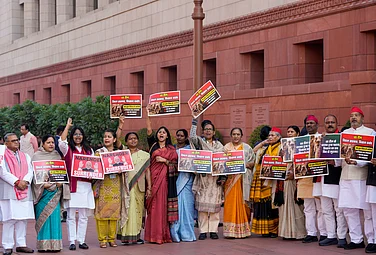More than 600 children and young adults including Greta Thunberg have filed a class action lawsuit against the Swedish state for failing to take adequate measures to stop climate change and violate the European Convention on Human Rights.
The lawsuit urges that the government must undertake its fair share of global measures to keep greenhouse gas emissions consistent with the Paris Agreements' goals.
Cutting greenhouse gas emissions is key to meeting the 2015 Paris Agreement target of keeping global warming below 2C. However, Russia’s invasion of Ukraine in February triggered a scramble for energy that’s set back efforts. Even the new Swedish government’s policies on climate change have been facing intense scrutiny. The cabinet, which assumed power in September, has announced it will scrap the environment ministry altogether. Its 2023 budget has included measures that will increase emissions from the transport sector.
Also in light of talks at the recently concluded COP27 for a separate loss and damage fund from developing nations, Thunberg believes climate laws should be tightened. “We don’t have laws that provide long-term protection from the consequences of climate and environmental crises, but we need to use the methods at our disposal and do everything we can," she said.
Thunberg, in 2019, along with 16 climate change activists had filed a lawsuit against five countries with the United Nation’s Third Optional Protocol to the Convention on the Rights of the Child. The lawsuit is filed against five countries Germany, France, Brazil, Argentina, and Turkey. The activists believe that these nations are “perpetuating climate crisis” by ‘failing to reduce emission’, and have also caused the activists harm by injuring them and preventing indigenous petitioners their right to their culture.
Why lawsuits work
Research by the London School of Economics Grantham Research Institute on Climate Change and the Environment found a surge in legal cases against the fossil fuel industry over the past year outside the US and growing action in other corporate sectors.
People have been filing legal challenges on climate change grounds since the mid-1980s, but the number of climate change-related litigation lawsuits around the world has more than doubled since 2015. One quarter of the 2,002 recorded cases to date was filed in the past two years alone.
Climate lawsuits have been most successful in getting governments to cut national emissions. Increasingly, many are seeking compensation from historic polluters.
Lawsuits could force executives to testify under oath, make companies pay for climate adaptation, and change how firms do business. If the companies have to actually pay for all the damages they have caused, that’s going to be a huge disincentive.
The prospect of liability adds much-needed pressure for more ambitious climate action and finance for loss and damage.
Climate lawsuits will still be in vogue even if new loss and damage funding were agreed at the international level, there could be problems at the local level if the funds had not been properly allocated or cannot be compensated with cash.
Above all, they give a platform to victims of the climate crisis and give clarity on who is legally responsible for paying out.
Many of these cases attempt to tackle greenwashing, while litigants increasingly suggest consumer and lifestyle choices that can reduce emissions and prevent industry misinformation and inaction.
Cons of Lawsuits
Detractors say climate lawsuits are riddled with flaws. Ted Garrish from the Department of Energy in Annapolis, says that his city had accused energy producers of concealing information about climate change in a lawsuit last year. But in Annapolis, he says, flooding and waterfront erosion are expected after living on a coastal belt, and are not caused by only climate change. And that climate change is a global occurrence, and it should American energy companies must be forced to foot the bill for emissions from outside US borders.
An NGO called Systemic Justice says the wider climate litigation movement is dominated by “a white, middle-class and able-bodied perspective”, and says many more cases could be built to tackle the climate crisis’s compounding injustices.
Climate activists and lay people have also lost many cases. Early cases seeking damages from fossil fuel companies for Hurricane Katrina and for rising sea levels affecting the Alaskan coastal village of Kivalina failed. A 2017 lawsuit against German energy firm RWE by Peruvian farmer Saúl Luciano Lliuya, whose home could be flooded by a melting glacier, is becoming a big example of corporate liability.
Notable climate lawsuits in 2022
The Swedish lawsuit is part of an international wave of climate-related legal action, some of it targeting national governments.
- In Australia today, a court moved to block an $8.4bn coal mine development in Queensland on human rights grounds in a landmark case that highlights the mounting legal challenges to fossil fuel extraction around the world. The court said that the project would have infringed on the rights of First Nations people in Queensland because of its climate impact.
- On November 16, the first hearing took place in Germany to force carmaker BMW to "drastically reduce" the CO2 emissions of its vehicles, and that by October 31, 2030, BMW must build new passenger cars that emit a maximum of 604 million tons of CO2, or prove greenhouse gas neutrality for any CO2 emissions beyond this.
- Seven Utah youth between ages 10 to 19 filed a climate lawsuit earlier this year titled The Natalie R. v. State of Utah case. It argues Utah is contributing to climate change as air pollution has increased, which will impact the health and lifespan of the children here.
- Briana K (Kū), 15, and 13 other people, filed a lawsuit in June, suing the Hawaiian government for its failure to protect her constitutional right to a healthful environment, and is challenging the state’s transport department for operating a transportation system that prioritises fossil fuel-powered cars over other eco-friendly alternatives. They plan to force the department to fully decarbonise by 2045.


























